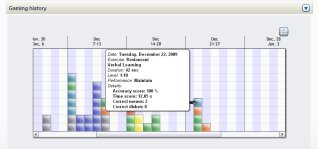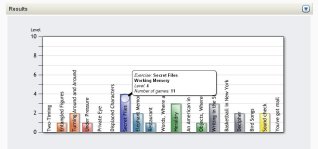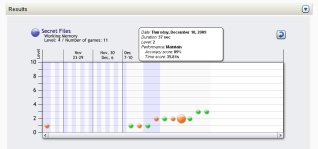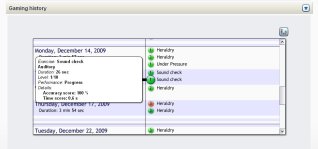The CR-Psychiatry Program
The Cognitive Remediation in Psychiatry Program provides a specific methodology for cognitive stimulation, which proved to be efficient in the treatment of schizophrenia and depression. The program comprises a set of specific exercises with pre-defined levels and sequences. The program was designed in partnership with Dr. Pascal Vianin from Lausanne Hospital in Switzerland and Pr Roland Jouvent La Pitié Salpétrière Hospital, Paris, France.
The CR-Psychiatry Program's exercises were shown to be clinically effective in the RECOS Method of Psychiatry Department of Centre Hospitalier Universitaire Vaudois (DP-CHUV) in Lausanne, Switzerland.
A organized according to the MATRICS cognitive assessment classification system
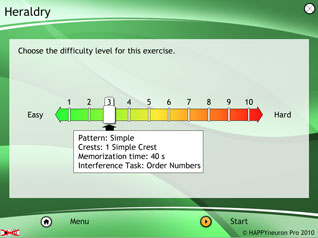
Sample of detailed control panel for selecting difficulty level
- Patient progression rules
- Each exercise has 10 pre-defined challenge levels
- The patient starts each exercise at level one.
- With two successful exercise results (100% accuracy) at one level, the patient graduates to the next level.
- Clinician has detailed views to the patient's progression through the program.
- Graphically view the patient activity level and progression achievement level for each targeted cognitive exercise.
Once you have selected your patient, you can see his/her results.
(Click to enlarge pictures)
The exercises are grouped in modules to ease the process of building an adapted training plan for your patients.
Processing Speed
Selective Attention / Vigilance
Working Memory
Verbal Learning
Visual Learning
Reasoning and Problem solving
Clinical Validation
The HAPPYneuron Pro CR-Psychiatry, and other programs have been validated in a number of clinical studies.
Click here for more information about Cognitive Therapy in Schizophrenia or in Depression.
Main Scientific publication:
Vianin, P., Deppen, P., Croisile, B., Tarpin-Bernard, F., Sarrasin-Bruchez, P., Dukes, R., Grillon, M. Exploratory Investigation of a Customized cognitive remediation program for individuals living with schizophrenia. The Journal of Cognitive Rehabilitation, NeuroScience Publishers, Volume 28. Fall 2010, pp 11-21, Click Here to Get an Electronic Copy
| Patient Condition | Notes |
|---|---|
| Schizophrenia | Schizophrenia induced cognitive impairments and therapies |
| Depression | Depression induced cognitive impairments and therapies |
| Bi polar disorders | |
| Post Traumatic Stress Disorders (PTSD) |
Paris 6 University at La Pitié-Salpêtriére Hospital
Poster at Cognitive Remediation Conference 2012, New York, June 2012


 Previous
Previous